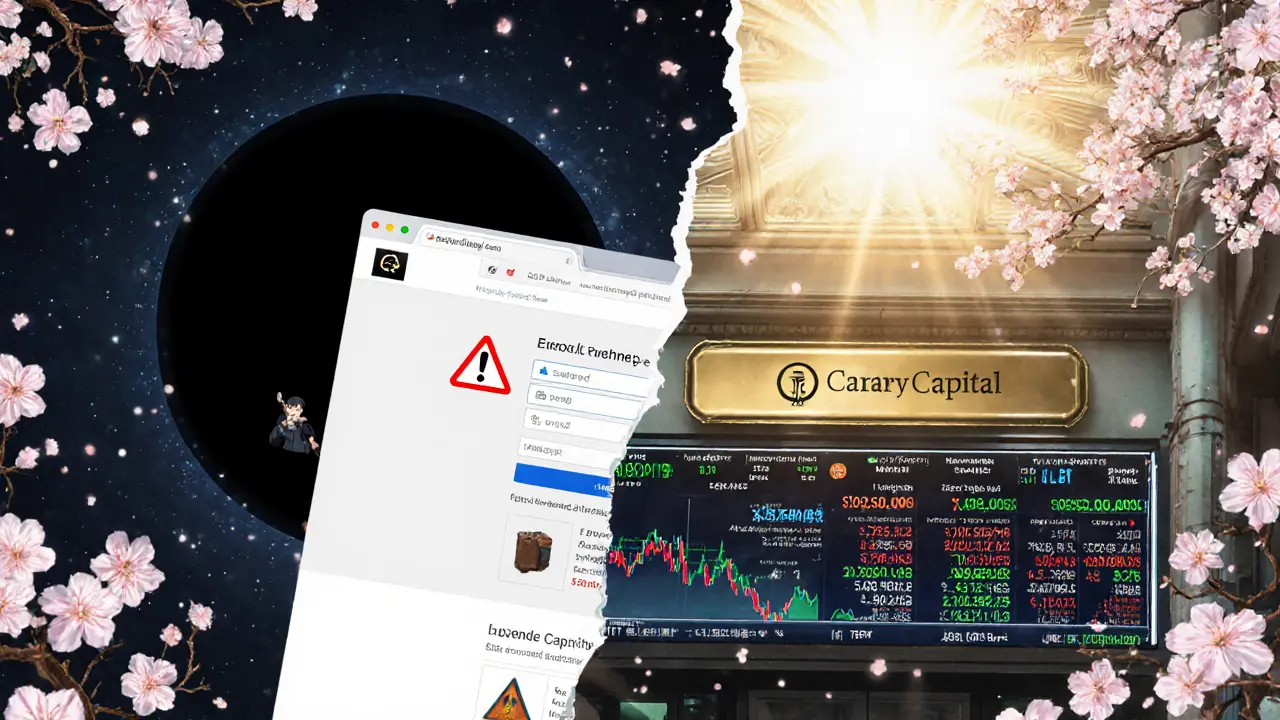Crypto Exchange vs ETF Comparison Tool
Enter your investment amount and frequency to see a practical comparison between using a crypto exchange and investing in a crypto ETF. This tool is designed to help you understand the key differences based on your specific situation.
Note: All data shown is based on 2025 market conditions. ETF approvals are still in progress and subject to change.
Trade actual cryptocurrencies directly on a regulated platform
Key Features
- Buy, sell, and store actual crypto assets
- Requires managing your own keys
- Lower fees on some platforms for high-volume traders
- Requires understanding of wallet security
Fees
Trading fees: 0.1% - 0.5%
Deposit fees: 0% - 1% depending on method
Withdrawal fees: $1 - $25 depending on network
Current Status
ApprovedAvailable now on multiple platforms
Invest in funds that track crypto prices through traditional brokerage accounts
Key Features
- Buy through regular stock trading platforms
- No need to manage private keys
- Accessible to traditional investors
- Less control over individual assets
Fees
Trading fees: 0% - 1% (if using commission-free broker)
Management fee: 0.1% - 0.5% annually
No withdrawal fees
Current Status
In ReviewWaiting for SEC approval (varies by fund)
Estimated Investment Results
Trading Fees: $0.00
Estimated Value: $0.00
Management Fees: $0.00
Estimated Value: $0.00
Which is Better for You?
There’s no such thing as Canary Exchange-at least not as a crypto trading platform. If you’re searching for it, you’re not alone. Many people mix up the name with Canary Capital, a completely different company that’s making waves in the crypto ETF space. And that confusion is costing people time, money, and trust.
Let’s clear this up once and for all. Canary Capital is not a crypto exchange. It doesn’t let you buy Bitcoin, trade Solana, or swap tokens on a wallet. It doesn’t have an app, a website where you deposit funds, or a customer support team for withdrawal issues. What it does do? File paperwork. A lot of it. With the SEC. For crypto ETFs.
What Canary Capital Actually Does
Canary Capital is an investment firm founded by Steven McClurg in October 2024. Before this, McClurg ran Valkyrie Investments, where he helped launch some of the first Bitcoin ETFs in the U.S. After the 2024 election cycle shifted dramatically-especially after the Trump assassination attempt and the subsequent market rally-he saw an opening. If Trump won, regulatory agencies might soften on crypto. So he started filing for ETFs that could ride that wave.
What’s an ETF? It’s a fund you buy on the stock market that tracks an asset-like Bitcoin or Ethereum. Instead of owning the actual coin, you own shares of a fund that holds it. Canary Capital isn’t trying to build a crypto exchange. It’s trying to make crypto accessible through traditional brokerage accounts like Fidelity or Charles Schwab.
They’ve filed for ETFs tracking Litecoin (LTC), XRP, Solana (SOL), Hedera (HBAR), Sui (SUI), and Tron (TRX). The most talked-about one is the Canary American-Made Crypto ETF (MRCA). This fund would only include coins developed or mined in the U.S.-think XRP, Solana, Dogecoin, Cardano, Chainlink, and Stellar. No stablecoins. No memecoins. No foreign tokens. Just American-born crypto.
Why People Think Canary Exchange Is Real
The name confusion is understandable. Both have “Canary” in them. Both are in crypto. Both show up in Google searches. But one is a financial product firm. The other-Canary Exchange-is a ghost. There’s no domain, no social media presence, no registered business entity, no user reviews on Trustpilot or Reddit. Nothing.
Some sites are even using “Canary Exchange” as a fake name to lure people into phishing scams. You’ll see ads promising “low fees” or “fast withdrawals,” but when you click, you land on a cloned interface that looks like Binance or Coinbase. They ask for your seed phrase. They steal your funds. Then they vanish.
There’s no record of Canary Exchange being licensed by any financial regulator-FINRA, ASIC, FCA, or any other. No company filings. No legal address. No team members listed. If you’re looking to trade crypto, don’t trust anything with that name.
What You Can Actually Do With Canary Capital
If you’re interested in Canary Capital, your only real option is to wait. They’re not offering products yet. Not even close. Their ETFs are still under review by the SEC. The Litecoin ETF filing was officially received on January 29, 2025, starting a 240-day clock. As of November 2025, no decision has been made.
McClurg is betting big on XRP. He believes the SEC’s lawsuit against Ripple is fully resolved, and that institutional demand will surge once an XRP ETF launches. He thinks it could bring in $5 billion in the first month. That’s more than the combined first-month inflows of all Bitcoin and Ethereum ETFs in 2024.
But here’s the catch: ETFs aren’t instant. The SEC can delay decisions. They can ask for more data. They can deny outright. Solana ETFs were rejected in 2024 under the previous leadership. After Trump’s inauguration, Cboe BZX resubmitted those filings. Now they’re waiting again. There’s no guarantee any of these will ever launch.

What to Do Instead of Searching for Canary Exchange
If you want to trade crypto, use real exchanges. Not fake names. Not confused brands. Here’s what works in 2025:
- Coinbase - Best for beginners in the U.S. with FDIC-insured USD balances.
- Binance.US - Offers 100+ coins, low fees, but limited to U.S. residents.
- Kraken - Strong security, great for advanced traders and staking.
- Bybit - Popular for derivatives and futures trading.
- Bitstamp - One of the oldest, regulated in Europe and the U.S.
All of these are licensed, audited, and have public support teams. You can find their terms, fees, and security practices online. You can read user reviews from real people who’ve lost or made money on them.
Canary Capital? You can’t deposit money. You can’t trade. You can’t even sign up. It’s not a platform. It’s a proposal. A legal document. A bet on politics.
Red Flags That Canary Exchange Is a Scam
Here’s how to spot a fake exchange-before you lose everything:
- No official website with HTTPS and a clear domain (e.g., canaryexchange.com doesn’t exist or redirects to a sketchy site).
- No physical address or registered company number.
- No information about the team-no LinkedIn profiles, no past experience.
- Promises of “guaranteed returns” or “risk-free trading.”
- Asks for your private keys or seed phrase.
- Only accepts crypto payments for “account activation.”
Canary Exchange checks every single one of these boxes. It’s a trap.

Canary Capital’s Bigger Play
Even if you can’t trade through Canary Capital, their strategy matters. They’re pushing for crypto ETFs that track more than just Bitcoin. That’s a big deal. If the SEC approves an XRP or Solana ETF, it means those coins are being treated like legitimate assets-not just speculative tokens. That could change how banks, pension funds, and even your 401(k) invest in crypto.
They’re also using proprietary indices instead of CME benchmarks. That means they’re not just copying what’s already out there. They’re building their own rules. For example, their American-Made ETF excludes tokens that are just copies of others or pegged to U.S. dollars. That’s a smart move. It avoids the mess of stablecoin collapses like TerraUSD.
They’re also planning to stake their proof-of-stake assets through third-party custodians. That means if their ETF gets approved, it won’t just hold coins-it’ll earn rewards on them. Those rewards go straight into the fund’s value. That’s better than just holding and hoping.
But again-you can’t buy into it yet. Not now. Not until the SEC says yes.
Final Verdict: Skip Canary Exchange. Watch Canary Capital.
Canary Exchange doesn’t exist. Don’t waste your time looking for it. Don’t click on ads. Don’t send any crypto. You’ll lose it.
Canary Capital? It’s real. But it’s not for trading. It’s for watching. If you’re interested in how crypto becomes mainstream, follow their ETF filings. Watch the SEC’s decisions. See if XRP or Solana ETFs get approved. That’s where the real action is.
Until then, stick to exchanges you can verify. Use Coinbase. Use Kraken. Use Bitstamp. Keep your keys safe. And never trust a name that sounds too similar to something real-especially when it’s not.
Is Canary Exchange a real crypto exchange?
No, Canary Exchange does not exist as a crypto trading platform. All search results pointing to it are either mistaken or malicious. The name is often confused with Canary Capital, a crypto ETF firm. There is no website, app, or licensed entity operating under the name Canary Exchange.
What is Canary Capital?
Canary Capital is a U.S.-based investment firm founded by Steven McClurg in October 2024. It files applications for cryptocurrency exchange-traded funds (ETFs) with the SEC, including for Litecoin, XRP, Solana, and others. It does not operate a crypto exchange or allow users to trade directly.
Can I invest in Canary Capital’s ETFs right now?
No. None of Canary Capital’s ETF applications have been approved by the SEC as of November 2025. They are still under review. You cannot buy shares in any of their proposed funds until the SEC gives final approval.
Why do people think Canary Exchange is real?
The confusion comes from the similarity in names between Canary Capital and the fictional Canary Exchange. Scammers exploit this by creating fake websites and ads that mimic real exchanges. These sites often ask for private keys or deposit fees, which is a clear sign of fraud.
What are the safest crypto exchanges to use in 2025?
The safest exchanges in 2025 include Coinbase, Kraken, Binance.US, Bybit, and Bitstamp. All are regulated, have public security audits, offer customer support, and allow users to withdraw funds without delays. Always verify the official website URL before logging in.
What’s the difference between a crypto exchange and a crypto ETF?
A crypto exchange lets you buy, sell, and store actual cryptocurrencies like Bitcoin or Ethereum. A crypto ETF is a fund traded on stock exchanges that tracks the price of one or more cryptocurrencies-you own shares in the fund, not the coins themselves. ETFs are easier for traditional investors but offer less direct control.
Has the SEC approved any non-Bitcoin crypto ETFs yet?
As of November 2025, the only approved crypto ETFs in the U.S. are for Bitcoin and Ethereum. Canary Capital’s filing for a Litecoin ETF was the first non-Bitcoin, non-Ethereum application to enter the formal 240-day review period, but it has not been approved yet.



Emily Michaelson
November 22, 2025 AT 22:42Just spent 20 minutes googling Canary Exchange because I thought I missed an update. Glad I found this. Seriously, people need to double-check names before sending crypto anywhere. I’ve seen so many fake sites lately-this one’s especially sneaky because it sounds legit.
Kathy Alexander
November 23, 2025 AT 03:00Canary Capital is just another Wall Street play trying to monetize crypto without actually touching it. ETFs are for people who don’t understand blockchain. You don’t own the asset-you own a piece of paper that tracks it. This isn’t innovation, it’s financial theater.
Soham Kulkarni
November 23, 2025 AT 22:43bro i was just scammed by a site called canary exchange last month. thought it was real cause the logo looked like binance. lost 0.3 eth. now i check every domain twice. also, canary capital is real but you cant invest yet. just wait for sec decision. dont rush.
Tejas Kansara
November 24, 2025 AT 04:42Stick to Coinbase or Kraken. No exceptions. If a site doesn’t have a clear .com and support team, it’s a trap. Canary Exchange? Doesn’t exist. Canary Capital? Still in paperwork mode. Don’t confuse filing with functionality.
Rajesh pattnaik
November 25, 2025 AT 00:26in india we have a lot of people getting fooled by names like this. i told my cousin not to use canary exchange after he saw an ad. he thought it was new indian exchange. i showed him the difference between exchange and etf. he was shocked. maybe more education needed.
Lisa Hubbard
November 26, 2025 AT 00:30Look, I get that Canary Capital is trying to do something with ETFs, but let’s be real-this whole thing feels like a distraction. The SEC is slow, the market is volatile, and now we’re supposed to care about a bunch of filings that might never happen? Meanwhile, actual exchanges are getting better, cheaper, and more secure. Why are we even talking about a company that doesn’t let you trade? It’s like obsessing over a menu while starving because the restaurant won’t open yet.
jocelyn cortez
November 26, 2025 AT 03:46Been following this since January. The XRP ETF filing is the most interesting part. If it gets approved, it changes everything. Not because of Canary Capital-but because it means the SEC might finally stop treating crypto like a gamble. Just hope they don’t screw it up with weird restrictions.
Belle Bormann
November 26, 2025 AT 12:00oops i just typed canary exchage in my browser and got a phishing site. lucky i didnt enter my seed. this post saved me. thanks! also canary capital is not a place to deposit money its just a legal team with a plan. dont get fooled.
Jody Veitch
November 26, 2025 AT 15:39It’s pathetic that Americans are being lured by fake names while ignoring the real innovation happening overseas. Canary Capital’s American-Made ETF is a nationalist fantasy. Why exclude foreign tokens? XRP is developed in California, Solana in San Francisco-these aren’t foreign. But if you’re going to play politics with crypto, at least make it coherent. This is just performative regulation wrapped in patriotism.
Dave Sorrell
November 28, 2025 AT 15:10For anyone confused: Canary Exchange = non-existent. Canary Capital = real entity filing for ETFs. The distinction matters. If you want to trade crypto, use regulated platforms like Coinbase, Kraken, or Bitstamp. If you want to track potential future investments, monitor SEC filings for Canary Capital’s ETFs. But never confuse the two. One is a trading platform. The other is a legal proposal. One you can use today. The other, you can only watch.